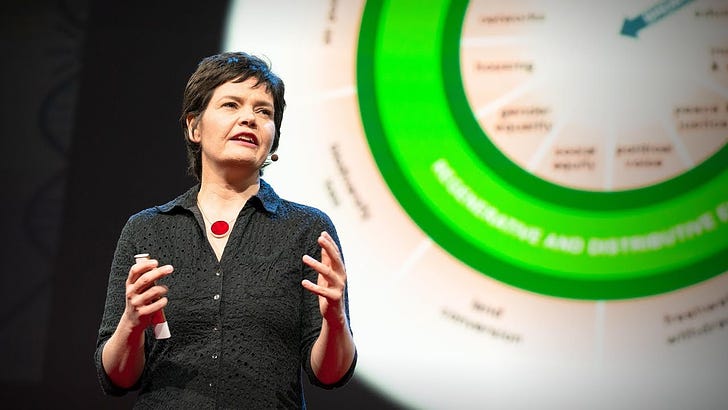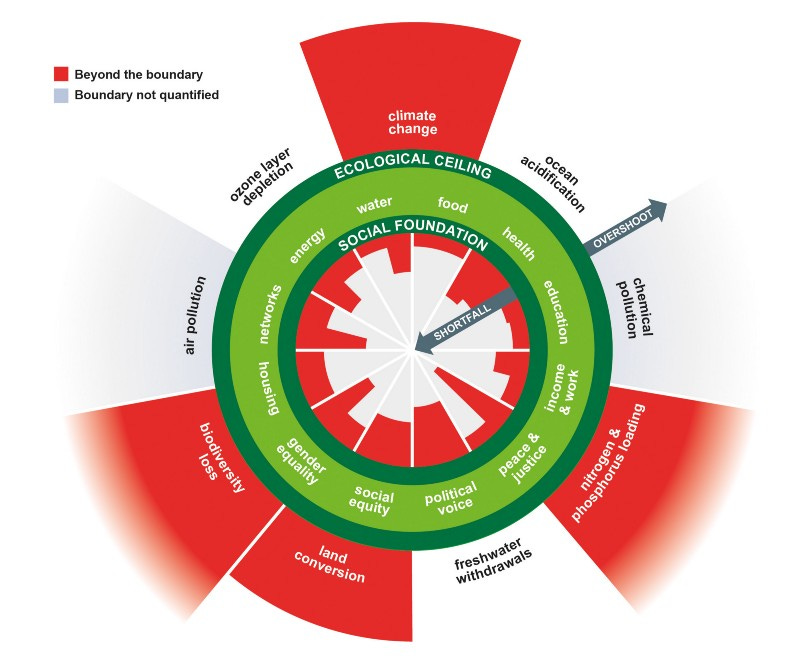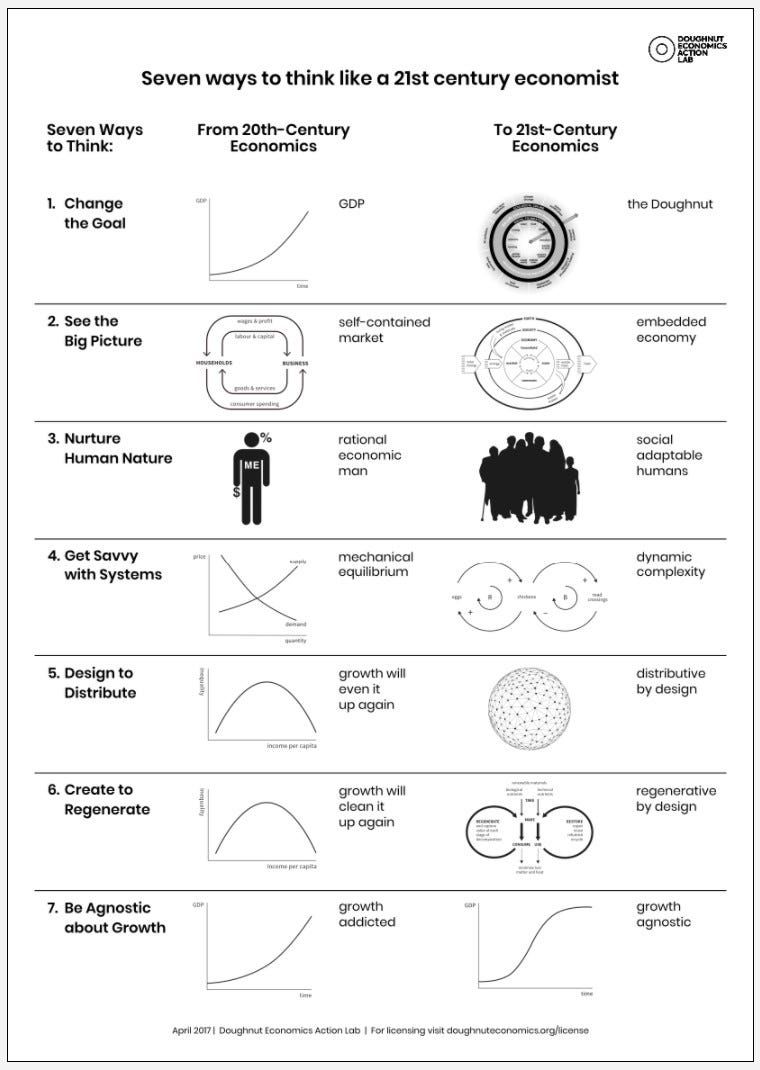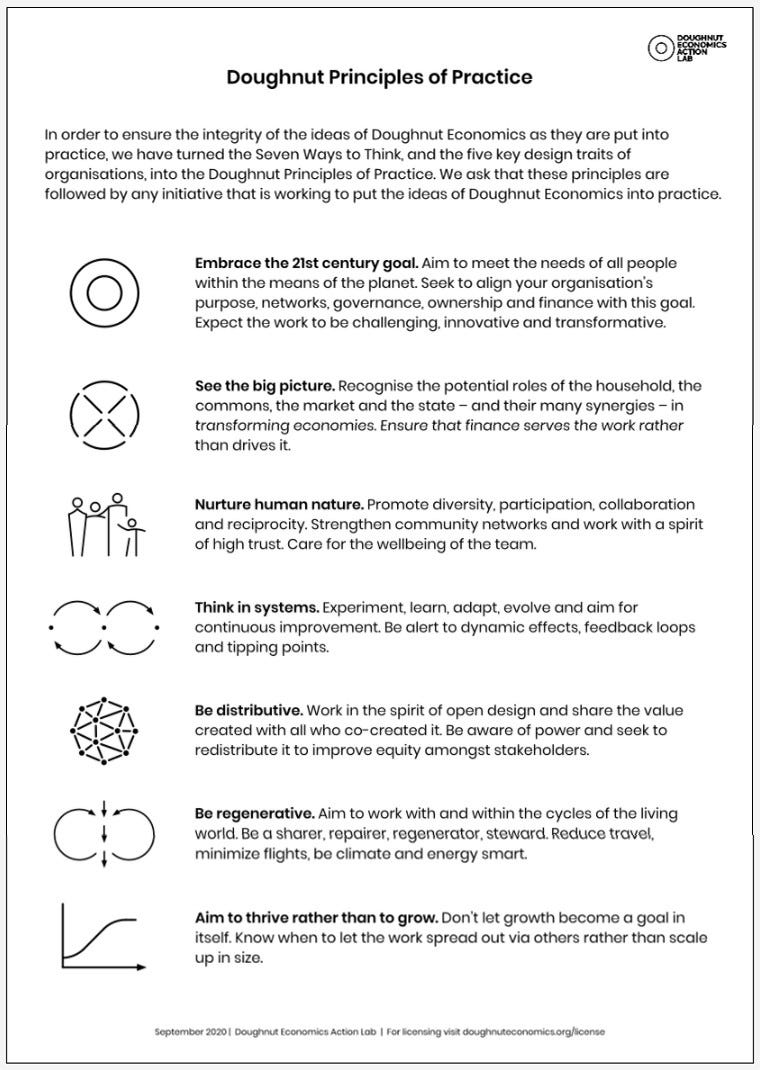Doughnut Economics: Living within the limits
Learn more about Kate Raworth's concept of the “Doughnut” of social and planetary boundaries, from her 2017 book Doughnut Economics: Seven Ways to Think Like a 21st Century Economist.
In the classes I teach on Sustainability & Social Responsibility + Corporate Sustainability at the Leadership & Strategy Department of Ateneo de Manila University’s School of Management, I don’t sugarcoat the misdeeds of some large corporations in their pursuit of profit. I start my first module with a lot of things that make us question what is wrong with people and corporate leaders more specifically. But as I promise my students at the beginning of my courses, after all that possible disillusionment, there is hope. My succeeding modules then help them to start looking at positive innovations already in play, and the below framework of the Doughnut segues nicely in between. :)
While taking my MSc in Sustainable Development in the UK from 2018–2019, I was introduced to many concepts and many esteemed thinkers, and one of the most memorable ones is Kate Raworth and her concept of the “Doughnut” of social and planetary boundaries, on which she published the 2017 book entitled Doughnut Economics: Seven Ways to Think Like a 21st-Century Economist. I would recommend it as reading for anyone interested in improving the state of the planet, whether or not you aspire to be an economist.
Understanding and appreciating Raworth’s doughnut is relevant to corporations too, because all too often, corporations make decisions in a vacuum, without bigger picture thinking about broader economic issues, which they can contribute to improving or worsening.
Raworth deems herself as a “renegade economist”, and I would put her alongside the likes of Tim Jackson and Ha-Joon Chang for their progressive thinking. She is focused on exploring the economic mindset needed to address the 21st century’s social and ecological challenges. Check out the TED talk below, delivered in 2018, for an introduction to her Doughnut.
You may also access the transcript of the video here, along with some of my highlights.
“It’s time to think again, to reimagine the shape of progress, because today, we have economies that need to grow, whether or not they make us thrive, and what we need, especially in the richest countries, are economies that make us thrive whether or not they grow.”
- Kate Raworth
In her book and in her TED talk, Raworth, along with other ecological economists, argued that we’ve mistakenly used GDP, or Gross Domestic Product, as a basis of a “thriving” country, when in fact, we should also be looking at other indicators of what it truly means for society and our planet to thrive.
Here’s an amusing video by the lovely political-comedienne Francesca Fiorentini on how GDP is a poor measure for well-being, published in August 2019:
Now, back to Raworth.
In her TED talk, she says, “we’re politically addicted to growth because politicians want to raise tax revenue without raising taxes and a growing GDP seems a sure way to do that”. She adds:
“Global GDP is 10 times bigger than it was in 1950 and that increase has brought prosperity to billions of people, but the global economy has also become incredibly divisive, with the vast share of returns to wealth now accruing to a fraction of the global 1%.
And the economy has become incredibly degenerative, rapidly destabilizing this delicately balanced planet on which all of our lives depend. Our politicians know it, and so they offer new destinations for growth. You can have green growth, inclusive growth, smart, resilient, balanced growth. Choose any future you want so long as you choose growth.”
“I think it’s time to choose a higher ambition, a far bigger one, because humanity’s 21st century challenge is clear: to meet the needs of all people within the means of this extraordinary, unique, living planet so that we and the rest of nature can thrive,” she says.
Below is Raworth’s visual representation of this Doughnut, and with it, she says:
“So imagine humanity’s resource use radiating out from the middle. That hole in the middle is a place where people are falling short on life’s essentials. They don’t have the food, health care, education, political voice, housing that every person needs for a life of dignity and opportunity. We want to get everybody out of the hole, over the social foundation and into that green doughnut itself.
But, and it’s a big but, we cannot let our collective resource use overshoot that outer circle, the ecological ceiling, because there we put so much pressure on this extraordinary planet that we begin to kick it out of kilter. We cause climate breakdown, we acidify the oceans, a hole in the ozone layer, pushing ourselves beyond the planetary boundaries of the life-supporting systems that have for the last 11,000 years made earth such a benevolent home to humanity.”
So, what if we could provide for the social foundations (as opposed to excesses) of the people on this Earth without exceeding our planetary boundaries? And how might we do it?
Raworth argues that the old way of thinking, dominated by 20th-century neoliberal economics, and the concentration of wealth, knowledge and power, should have no place in the design of the 21st-century.
She says we need economies that are regenerative and distributive by design. This includes concepts such as the circular economy, decentralization of power through local hubs vs. a concentration of power with wealthy behemoths of transnational corporations that pursue growth to no end. Below are the key mindsets and principles of Raworth’s economics of tomorrow, which we should be working towards today.
Questions for reflection:
What industries and business models do you see taking precedence when we adopt a Doughnut mindset? And how do you see them redistributing wealth to society and regenerating the natural environment?
In terms of the Philippine context, how do you see arguments critiquing “obsessions” with GDP growth? (Personally, although I am in favor of alternative measures of prosperity, this is an idea I’m still grappling with with given that critiques of GDP-obsession or ideas of “degrowth” have often come from the developed countries, while many people in developing countries are still struggling to meet basic needs. Would love to know the thoughts of those working in the Global South.)
You can learn more about doughnut economics via doughnuteconomics.org/about-doughnut-economics.
And if you read this in time, you can also join For ReGenerations, a learning event that brings together the Doughnut Economics team (including Kate Raworth herself!) with Filipinos who are working to shape social, economic and environmental systems to fit inside the doughnut. It’s happening on July 31 from 2:30–5:30PM, brought to you by Habilin and Archers for UNICEF. Check out @muni_ph’s instagram for the speaker lineup and program schedule here + our Doughnut Economics explainer here.






